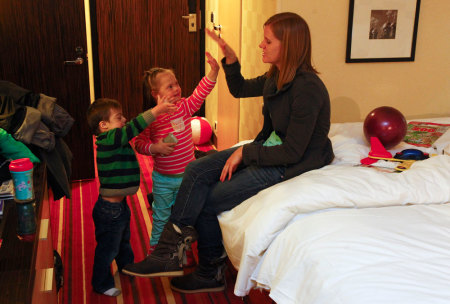Int'l Adoptions Drop to Lowest Numbers in Over 20 Years
American adoptions of international children have dropped to their lowest number in more than 20 years. In a report released Friday from the U.S. State Department, only 7,094 children from overseas were adopted in the 2013 fiscal year, over 1,500 fewer than the 8,668 adopted in 2012.
The numbers are nearly two thirds down from the 22,884 adopted internationally in 2004 and are at their lowest point since 1992, The Associated Press reports.

Ryan Hanlon, the executive director of programs at American World Adoption, said that one factor driving the numbers down is Russia's 2012 ban on international adoption. But he also pointed to larger failures within the adoption apparatus since its zenith during the last decade.
"There's been a decrease since 2004, and it's been systematic and it's been going down very sharply," Hanlon told The Christian Post. "If this was just one year where they declined by 1,000 or 2,000, I think we can look at very specific numbers. But if I was a reporter, I'd ask, 'Why have they declined so sharply in a decade and what's the bigger cause behind that?' I do think a big part of that is the failed role of the Department of State to work in cooperation with other nations."
"The State Department has been overly concerned with fraudulent adoption to the point where they have neglected to encourage and support potential adoptive families and adoptees," said Hanlon.
"I want to be really clear that I think it's important and good that they want to prevent fraudulent adoptions. ... I think it's an important goal, but I don't think it's the only goal," he added.
At 2,306 children, the most common nation for Americans to adopt from is China, whose government Hanlon pointed to as a model for how governments ought to interact with adoption agencies.
"China's Central Authority is very centralized and systematic. They're very consistent. For example, at our agency, if we ask the Central Authority in China a question about a particular family, their response is very reliable, even if the family does not complete their adoption for a couple more years. They're very organized and treat families equitably...and we don't always see that with other countries," said Hanlon.
An AP story also noted that adoptions have declined in Ethiopia, the second-most common nation to adopt from, because of moves by authorities to try and "place more abandoned children with relatives or foster families," and an "intensified [amount of] scrutiny of orphanages to ensure that children placed for adoption are not part of any improper scheme."
But Hanlon said that, in this instance, the State Department has also played a role in complicating the situation.
"The U.S. government has made it difficult on the Ethiopian government to process adoptions," said Hanlon. "I also think that the changes that the U.S. government started requiring at the end of 2013 have impacted the numbers — I actually think it's going to be worse when we see 2014 numbers because of the new process that the U.S. Department of State requires, called pre-adoption immigration review. I think there's just been a failure of our government and the Ethiopian authorities to work cooperatively."
Hanlon expressed little hope for short term changes in international adoption numbers, but pointed to the Children in Families First Act, which he suggested could have a long term positive effect on the system. The bill would fund a new bureau within the State Department charged specifically with partnering with existing adoption agencies and foreign governments on family reunification, fighting fraudulent adoptions and supporting domestic and international adoption.
Still, the numbers are likely to stay low for some time.
"I'm not overly optimistic about the short-term future of international adoption...[the U.S. State Department report on international adoption] goes on the government's fiscal year, so those numbers are…only good until September 2013, so we're really only six months into the next reporting period. The Department of State purposely withheld these numbers for a long time — usually they've reported them well before now, but they're so bad and they're under a lot of pressure. We're already halfway into the next year and I think things are only going to look worse when we see the 2014 numbers."






















